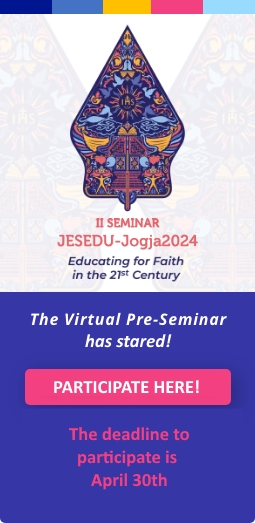Where do you stand on Artificial Intelligence today and going forward?
For many decades Jesuit education has been offering solid intellectual formation but also a quality education that centers on forming persons of Conscience, Competence, Commitment, and Compassion.
“These four adjectives express the ‘human excellence’ that the Society of Jesus wants for the youth who society has entrusted to us:
Of Conscience, in addition to knowing themselves…they have a consistent knowledge and experience of society and its imbalances.
Competent, professionally speaking, they have an academic background that exposes them to advances in science and technology.
Compassionate, they are able to open their hearts to be in solidarity with and assume the suffering of others.
Committed, they honestly strive toward faith, and through peaceful means, work for social and political transformation of their countries and social structures to achieve justice.”
(Fr. Adolfo Nicolas, 2013, p. 4)
Do you think that Artificial Intelligence could help or hinder the aim of Jesuit Education?
Dr. Kathy Hirsh-Pasek, a senior fellow on Global Economy at the Center for Universal Education, and Elias Blinkoff, a graduate student at Temple University argue:
“Tools like ChatGPT can help promote students’ critical thinking when used in sophisticated ways for deeper, more engaged learning.”
Read more in the article How AI can accelerate students’ holistic development and make teaching more fulfilling.
In addition, Bill Gates, founder of Microsoft, states:
“Education nonprofits like Khan Academy and OER Project, which I fund, offer teachers and students free online tools that put a big emphasis on testing assertions. Few skills are more important than knowing how to distinguish what’s true from what’s false“.
Read more in The risks of AI are real but manageable.
On the other hand, Allie Ruden, a senior at Jesuit High School and a second-year journalism student, reflects:
“Many educators, including English teacher Mr. Konrad Reinhart, are slightly concerned yet excited about the opportunity to interact with AI. His major apprehension is that students will outsource their critical thinking to AI.”
Read more in this article AI and the Future of Education.
Furthermore, Sam Harris, a philosopher and neuroscientist, warns:
“The gains we make in Artificial Intelligence could ultimately destroy us. I worry about the near-term problem of what humans do with the increasingly powerful AI. How it amplifies misinformation. Can we hold a presidential election 18 months from now that we can recognize as valid?”
Listen more on this video WARNING By Sam Harris: ChatGPT Could Be The Start Of The End. AI “Could Destroy Us, The Internet And Democracy”.
Finally, Chris Brooks, from Conversations on Jesuit Higher Education, reflects:
“The fundamental AI dilemma is not the creation of an other that will take over or enslave us and needs to learn ethics. Rather, the issue is us — the risks and flaws in COMPAS come from developing systems that perpetuate our own biases, that allow us to take action without grasping the consequences, and that replicate the inequities and injustices that are part of our world.”
Read more in this article Artificial Intelligence: The brave new world of moral issues.
